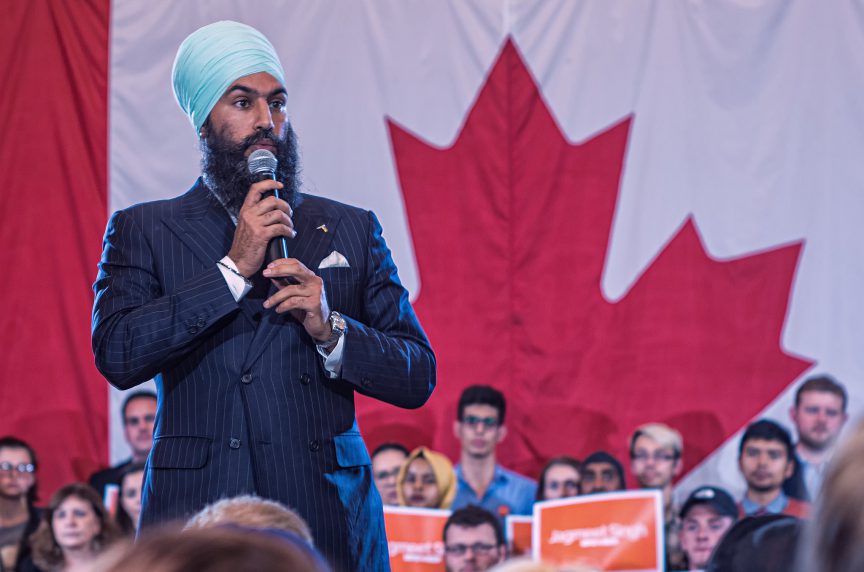With a General Election Imminent, Canada’s Left Must Learn From Sanders and Corbyn
by Alireza Naraghi
5 September 2019

With Canadian prime minister Justin Trudeau’s image severely damaged by the SNC-Lavalin affair, and the country’s Tory party associated with bigoted, xenophobic elements, can the left-wing New Democratic Party (NDP) replicate the campaign strategies of Jeremy Corbyn and Bernie Sanders in time for Canada’s 21 October election?
For Janice Cooper, who worked as an organiser for Bernie Sanders’ 2016 campaign, the answer is a resounding yes.
Speaking at the Broadbent Institute’s Progress Summit – a Canadian conference to bring ‘thought leaders, movement builders, elected officials, and frontline activists’ together – this past March, Cooper said:
“The majority of voters who I talked to want to see a genuine, material change in their lives. There are many people who feel like they have no agency and the economy is not working for them.”
Having watched Bernie Sanders shaking up the political terrain in the US, Cooper is convinced there’s a fundamental appetite for a new kind of politics in Canada, but she believes the NDP still has work to do if it wants to “translate the energy into political power”.
Cooper believes there’s a “useful lesson to be learned” from the American left and the failure of the centrist project, which she argues is dominated by “charming optics but with hollow promises” and ultimately fails to meet expectations.
“We had our Obama moment already,” she says.
“Charisma and flair are simply not good enough anymore, not with this emerging generation of voters, not with xenophobia and white nationalism on the rise.”
Cooper thinks Canada is primed for a tectonic shift in its politics – but can it happen before the country goes to the polls next month?

The Broadbent Institute summit was staged, in part, to shift the conversation beyond what is perceived as palatable in the mainstream political landscape. Perhaps the most instructive example was a debate titled “This Is What Left Populism Looks Like”, which aimed to conjure a transnational movement, potent enough to confront the rise of right-wing populism and the neoliberal consensus.
And some of those ideas might be gaining ground inside the NDP.
Jeremy Corbyn recently revealed he had a telephone conversation with the NDP leader, Jagmeet Singh, on building an “international left movement” to tackle the “populist far right,” and how they must “work across borders to tackle global inequality, the power of big corporations and the climate emergency”.
Interesting call with @theJagmeetSingh, Leader of Canada’s @NDP, on the importance of building an international left movement against the populist far right, and how we must work across borders to tackle global inequality, the power of big corporations and the climate emergency.
— Jeremy Corbyn (@jeremycorbyn) June 18, 2019
Singh responded with his own tweet, saying: “Together we can be united in our fight for an economy that works better for all people, not just the wealthy few & create a cleaner, fairer world where everyone can build a good life”.
It was a pleasure to talk about our shared vision of putting people first @jeremycorbyn. Together we can be united in our fight for an economy that works better for all people, not just the wealthy few & create a cleaner, fairer world where everyone can build a good life. https://t.co/EFtK4OTyQn
— Jagmeet Singh (@theJagmeetSingh) June 18, 2019
The NDP election platform, unveiled in June and titled “A New Deal for People”, proposes cracking down on offshore tax havens, retooling the energy sector to tackle the climate emergency, while hiking the rates paid by corporations and the super rich, and going beyond symbolic support for reconciliation with indigenous communities.
Yet, the NDP is navigating through a precarious financial period and has struggled to translate its platform into strong poll numbers. Rick Smith, executive director of the Broadbent Institute, brushes off the poor figures, pointing to British Columbia’s NDP government, and the party’s strong showing in Alberta, Saskatchewan, Manitoba, and Ontario, as “something that would have been unimaginable a year ago”.
“The NDP are polling ahead of where Justin Trudeau and the Liberals were at this stage in 2015, ” he adds.
Currently, the NDP is hovering at around the 15% mark in the polls and is facing massive gaps in its candidate list. This has left many questioning the party’s ability to organise itself and has allowed detractors to undermine Singh in particular.
For the NDP, however, the good news is that young people still broadly support the party – and they might be rewiring Canadian politics.
In the UK, Corbyn has already proven what effective campaigning led by young people can do in a short period of time. Cast your mind back to just two years ago when Corbyn with his impressive community-based campaign all but made up a 20-point gap in a few short weeks before a snap election.
If the NDP is going to offer a radical alternative, it has to inspire young people who feel imprisoned by the emerging gig-economy, suffocated by a sense of insecurity, and alarmed about the unfolding climate crisis. In 2015, millennials supported Trudeau in overwhelming numbers. But after a dismal track record of broken promises – from indigenous justice to electoral reform to genuine climate action – he has largely left young voters feeling despondent, even deceived.
Meanwhile the success of people-powered, grassroots movement Momentum in shaping the Labour Party’s political discourse has stimulated similar movements in Canada.
Take for example, Courage, an organisation comprised of independent leftists which is creating a pan-Canadian membership-based coalition, bidding to “bridge the divide between movement and electoral politics”. There’s also The Leap Manifesto, another initiative supported by an unprecedented coalition of Canadian organisers, authors and national leaders, that is laying out a foundation for a bolder climate and economic policy beyond anything on offer from political parties.
But the political context is, of course, different in Canada to the UK.
“A crucial part of the backdrop to what’s happened in the UK and the US is that you have political parties that became full-blown neoliberal formations in the 1990s. In Canada, that process didn’t really happen,” says Luke Savage, a Toronto-based essayist and a staff writer for Jacobin Magazine.
Savage says that both Sanders and Corbyn are backed by the grassroots insurgency against a neoliberal project that is inherently hostile to traditional leftist values. The left in Canada has been complacent because that existential sense of urgency is less intense.
However, when it comes to anti-establishment campaigns, Savage points to some key elements that could, perhaps, be replicated in a Canadian context. “Bernie Sanders is showing that being very specific and programmatic, while drawing clear ideological lines in the sand, is actually good politics,” he says. He adds that social movements play a crucial role in forcing issues on to the agenda, and both Sanders and Corbyn provide a blueprint for how to counter the inevitable establishment hostility.
“I think Sanders is showing young people that at least intellectually there is an alternative to the status quo,” says Canadian historian Christo Aivalis. “I think Corbyn is doing something similar in Britain, and he’s challenging not only the Conservatives, but he’s also challenging the [prevailing political narrative.]”
Aivalis says that one of the fundamental errors the NDP made in the past was desiring “to be the party for all”, which damaged its credibility among working people and stripped away its authentic socialist disposition. He believes that one of the components of the Corbyn political strategy that should be replicated in Canada is his unapologetic emphasis on class-based politics.
What Aivalis points to is a brand of politics that has a rich history in Canada. In the early 20th century, farmers’ organisations started progressive movements in Ontario and the Prairies, which came together in the early 1930s to help form the Cooperative Commonwealth Federation and later paved the way for the creation of the NDP.
“I think there’s a weird lack of memory when it comes to the Canadian left,” Smith says over the phone. “And frankly, as a country, we didn’t make some of the same mistakes that occurred in the US and the UK.”
As the Canadian left searches for ways to revitalise themselves, they have inspiring and powerful precedents in this period of immense political volatility. The triumph of 28-year-old Democratic socialist Alexandria Ocasia-Cortez, the entire Corbyn project, and Sanders’ soaring popularity are striking examples of translating social movements into formative political power.
For the NDP, the question is clear: can the party, in this most unusual political moment, inspire the young, weave a coherent alternative and turn things around in a flash?
The ideological direction of the party may depend on the answer to that question.
Alireza Naraghi is a journalist and feature writer based in Toronto. He has written for Maclean’s magazine, HuffPost UK, Novara Media, and others.